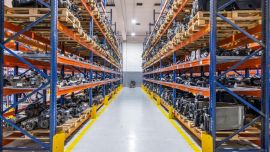Historic change is afoot in the country boasting more reserves of an indispensable battery metal than any other.
Chile is transforming its model for lithium extraction and production, with the government seeking majority stakes in new contracts with private companies. President Gabriel Boric is walking a fine line, seeking a fairer distribution of wealth from Chile’s resources, without compromising the country’s position as a major player in the clean-energy transition.
The number two lithium producer globally moving to a state-run system risks hindering supply of the highest-value mineral in the battery supply chain, just as the auto world needs it more than ever.
“Money is a coward,” Canadian mining billionaire Robert Friedland said this week, predicting that Chile’s new framework will deter investment. “It runs away at the first sign of trouble.”
Under Chile’s current model, companies sign operating contracts and are assigned quotas. Royalties paid to the government are by far the highest globally, at a marginal 40 percent rate of the lithium export price. With just two operations in a single salt flat, Chile has lost share of global production to countries with more investor-friendly rules, such as Argentina.
Uncertainty as to how the new state ownership model will work is “a huge negative,” said Joe Lowry, founder of advisory firm Global Lithium. Shares of SQM, which runs the world’s biggest brine operation in Chile’s northern desert, plunged a record 19 percent on April 21, the day after Boric announced his new strategy. Albemarle Corp. — Chile’s other producer — fell 10 percent.
Boric is looking for a bigger share of the mining windfall to help fund schools, hospitals, roads and bridges, and address inequalities in the wake of social protests that erupted in 2019. His model will also require operations in one of the driest places on Earth to adopt a new technique that uses less water, though the method is relatively untested at scale and initially may mean less output.
“The objective is control,” Economy Minister Nicolás Grau told Bloomberg in an interview. The various fundamental decisions that companies make must “respond to the interests that we have as a country.”
Boric’s administration has said its moves have been well received, as companies see benefits from partnering with the state in projects that would tap more of the world’s biggest resources. Gaining the acceptance of local communities and the broader society and navigating red tape may be easier for companies if they have the state as a partner.
Those upsides may apply to smaller exploration companies, BTG Pactual analyst César Pérez-Novoa said, but more established players would rather not be relegated to lesser roles.
The government has vowed to respect existing arrangements with SQM and Albemarle, which supply companies including Tesla Inc and South Korean battery maker LG Energy Solution Ltd. The government has given the two incumbents two options: keep full control for the rest of their contracts and risk losing it, or let the state take a majority stake sooner with the understanding they could keep operating longer.
SQM, whose contract expires in 2030, said it expects to reach an accord to continue producing under the new model, while Albemarle has more flexibility because its contract doesn’t expire until 2043.
While it was well-telegraphed, Chile’s new model for lithium still surprised many investors. Until there’s further clarity on financial risk-sharing, investors are likely to stay on the sidelines, according to Citigroup analysts. If uncertainty persists, they could divert capital to Australian and Canadian companies, they wrote in a report to clients this week. Argentina is another possible beneficiary.
Even if money does shift to other countries, EV makers may not have time to wait for those early-state projects to ramp up and produce, which takes years. Resource nationalism is also gaining strength elsewhere, with Mexico President Andrés Manuel López Obrador declaring lithium too strategic for private investors, and Myanmar, Zimbabwe and Indonesia implementing restrictions affecting various commodities.
“Chile has an undisputed reputation in sourcing critical minerals for the whole of the world, and this specific event — at least for the EV world — adds a fresh uncertainty in the supply chain,” said BTG Pactual’s Pérez-Novoa. “This uncertainty is counterproductive for the lithium market as a whole, and by extension for the EV industry that needs the supply.”
by Yvonne Yue Li & James Attwood, Bloomberg





















Comments